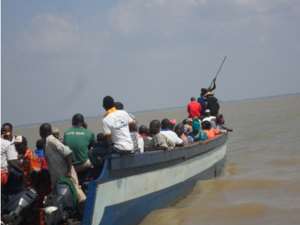
The picture you see is a boat fully loaded with passengers ready to cross the Volta Lake from Yeji (Brong Ahafo Region) to Makango (Northern Region). There are about 80+ passengers packed in this wooden boat; not even a single passenger has a life jacket on board.
The Lake that separates Makango and Yeji is so wide with a lot of tree stumps; waves on the Lake could also get so rough on occasions.
As immediate oriented people our authorities are, they will sit and watch this risky health behaviors continue. Quickly, they will react when there is an accident on any part of the Lake. As usual, they will constitute a committee to milk state money in the name of investigating into an obvious cause of accidents like this one in the picture.
We are in January, and most of such accidents in previous years were recorded in the first quarter, especially late March and the first two months of the second quarter. I am tempted to believe that such life-threatening behaviors are considered normal practices among operators across our Lakes and Rivers in Ghana – passengers onboard with no life jackets.
It is usually hard to figure out the maximum number of passengers a boat is supposed to take on a journey. In fact, such indications are not written on the boats as you would see on vehicles on our roads. When you ask the operators of the boats about the maximum number of passengers their boats could take on a journey, they fumble, if not being economical with the truth.
On a journey from Accra to Kumasi, Pusiga to Accra, Aflao to Kumasi, you are likely to encounter countless police check points. They check speeding, overload and enforcing other road safety regulations; aimed at protecting the lives of Ghanaians who travel on our road with vehicles. If the Road Safety Commission and the Motor and Vehicular Unit of the Ghana Police Service would insist on passengers and motorists wearing their sit belt and the crash helmet, why then are the lives of those who travel on our Lakes and Rivers left to the mercy of God?
One dangerous aspect of this situation is that most of these boats operate at night. Boats from Kwamekrom, Tepa-Abotuase as well as Kpando to Kete-Krachi, Daditokro, Yeji, and Buipe, other towns and villages along the Volta Lake including the Sene River do overload across these wide water bodies without protecting the lives of passengers onboard with life jackets. Interestingly, if not all, most of these boats on our Lakes are not licensed. Anybody at all could just grab a handle of outboard motor and start operating without necessary having passed any test of being an operator. It has gone on several years unchecked. Can that be said of the vehicular activities on our roads?
In April 2002, fifty (50) lives were lost in the Volta Lake after a boat accident which occurred near Amevloikope Island. Among the passengers were mostly pupils who were travelling from Tepa-Abotuase to Dudzoeme in the Afram Plains to spend holidays with their parents. Who knows if our next Komla Dumors, Azure Manassehs, Dede Ayews, teachers, doctors and future Presidents were the lives we lost during that accident. In September 2001, two bodies were reported lost on the Volta Lake after a boat which was carrying 18 passengers hit a tree stump, causing it to capsize close to a village called Ofieye, in the Brong Ahafo Region in the then Sene District. In similar development, in the middle of last year (2014), eighteen (18) persons have been confirmed dead in a boat accident involving about fifty (50) passengers close to a village called Agbletime-Kekekofe in the Volta Region, on the Volta Lake.
It is high time government and the ministry in charge of transports steps in and treats these concerns with much urgency. I look forward to government to regulating the activities of these boat operators; licensing them, providing strict threshold of passengers a boat could take on a journey, subsidizing life jackets for all licensed boat operators to purchase and to put marine police at various stopovers on our Lake and Rivers.
National Disaster Management Organization (NADMO) should also go beyond their post-disaster interventions to providing pre-intervention measures on our Lake and Rivers to curb the accidents on our water bodies. Inasmuch as we have the Road Safety Commission, it will be prudent to also institutionalize Water Safety Commission to protect precious lives on our water bodies.
Gbolu Samson
Email: [email protected]
+233 241115660




 Chief arrested for killing soldier at Kasoa over land
Chief arrested for killing soldier at Kasoa over land
 GAF probes soldier’s murder at Kasoa Millenium City
GAF probes soldier’s murder at Kasoa Millenium City
 Ghana steps up effort to pass new Labour law
Ghana steps up effort to pass new Labour law
 AG advises EOCO against money laundering probe into Cecilia Abena Dapaah’s affai...
AG advises EOCO against money laundering probe into Cecilia Abena Dapaah’s affai...
 May Day: I'll prioritise welfare of workers, abolish compulsory retirement age a...
May Day: I'll prioritise welfare of workers, abolish compulsory retirement age a...
 V/R: Adaklu-Tevikpo murder suspect arrested from hideout
V/R: Adaklu-Tevikpo murder suspect arrested from hideout
 Kasoa: Soldier killed by alleged land guards over land dispute — GAF
Kasoa: Soldier killed by alleged land guards over land dispute — GAF
 Fatal shooting of soldier happened at Gomoa East not Kasoa; stop tarnishing our ...
Fatal shooting of soldier happened at Gomoa East not Kasoa; stop tarnishing our ...
 ‘We condemn unprovoked attack in no uncertain terms’ — GAF on fatal shooting of ...
‘We condemn unprovoked attack in no uncertain terms’ — GAF on fatal shooting of ...
 Ghanaians urged to ensure violence free elections on December 7
Ghanaians urged to ensure violence free elections on December 7
